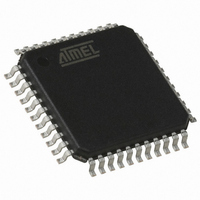AT89C51ID2-RLTUM Atmel, AT89C51ID2-RLTUM Datasheet - Page 76

AT89C51ID2-RLTUM
Manufacturer Part Number
AT89C51ID2-RLTUM
Description
IC 8051 MCU FLASH 64K 44VQFP
Manufacturer
Atmel
Series
89Cr
Datasheet
1.AT89C51ID2-RLTUM.pdf
(157 pages)
Specifications of AT89C51ID2-RLTUM
Core Processor
8051
Core Size
8-Bit
Speed
60MHz
Connectivity
I²C, SPI, UART/USART
Peripherals
POR, PWM, WDT
Number Of I /o
34
Program Memory Size
64KB (64K x 8)
Program Memory Type
FLASH
Eeprom Size
2K x 8
Ram Size
2K x 8
Voltage - Supply (vcc/vdd)
2.7 V ~ 5.5 V
Oscillator Type
External
Operating Temperature
-40°C ~ 85°C
Package / Case
44-TQFP, 44-VQFP
Processor Series
AT89x
Core
8051
Data Bus Width
8 bit
Data Ram Size
2 KB
Interface Type
UART, SPI, TWI
Maximum Clock Frequency
60 MHz
Number Of Programmable I/os
34
Number Of Timers
3
Operating Supply Voltage
2.7 V to 5.5 V
Maximum Operating Temperature
+ 85 C
Mounting Style
SMD/SMT
3rd Party Development Tools
PK51, CA51, A51, ULINK2
Minimum Operating Temperature
- 40 C
Package
44VQFP
Device Core
8051
Family Name
89C
Maximum Speed
40 MHz
Height
1.45 mm
Length
10.1 mm
Supply Voltage (max)
5.5 V
Supply Voltage (min)
2.7 V
Width
10.1 mm
For Use With
AT89OCD-01 - USB EMULATOR FOR AT8XC51 MCU
Lead Free Status / RoHS Status
Lead free / RoHS Compliant
Data Converters
-
Lead Free Status / Rohs Status
Details
Available stocks
Company
Part Number
Manufacturer
Quantity
Price
Company:
Part Number:
AT89C51ID2-RLTUM
Manufacturer:
ATMEL
Quantity:
13 937
Keyboard Interface
Interrupt
Power Reduction Mode
4289C–8051–11/05
P1:x
The AT89C51ID2 implements a keyboard interface allowing the connection of a
8 x n matrix keyboard. It is based on 8 inputs with programmable interrupt capability on
both high or low level. These inputs are available as alternate function of P1 and allow to
exit from idle and power down modes.
The keyboard interface interfaces with the C51 core through 3 special function registers:
KBLS, the Keyboard Level Selection register (Table 61), KBE, The Keyboard interrupt
Enable register (Table 60), and KBF, the Keyboard Flag register (Table 59).
The keyboard inputs are considered as 8 independent interrupt sources sharing the
same interrupt vector. An interrupt enable bit (KBD in IE1) allows global enable or dis-
able of the keyboard interrupt (see Figure 27). As detailed in Figure 28 each keyboard
input has the capability to detect a programmable level according to KBLS. x bit value.
Level detection is then reported in interrupt flags KBF. x that can be masked by software
using KBE. x bits.
This structure allow keyboard arrangement from 1 by n to 8 by n matrix and allow usage
of P1 inputs for other purpose.
Figure 27. Keyboard Interface Block Diagram
Figure 28. Keyboard Input Circuitry
P1 inputs allow exit from idle and power down modes as detailed in Section “Power
Management”, page 72.
P1.0
P1.1
P1.2
P1.3
P1.4
P1.5
P1.6
P1.7
Vcc
Internal Pullup
Input Circuitry
Input Circuitry
Input Circuitry
Input Circuitry
Input Circuitry
Input Circuitry
Input Circuitry
Input Circuitry
KBLS. x
0
1
KBF. x
KBE. x
KBD
IE1
AT89C51ID2
Keyboard Interface
Interrupt Request
KBDIT
76


















